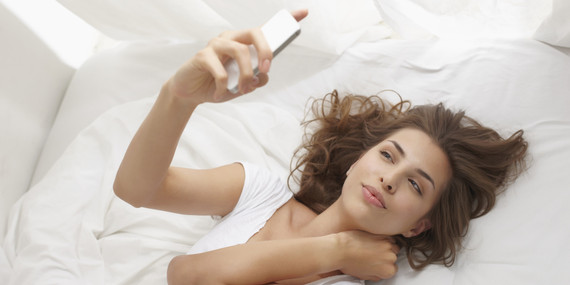This week, unless you were hiding under a rock from Donald Trump supporters or don't use social media at all, you would know that we were all bombarded with Kim Kardashian's nude selfie scandal.
Okay, it wasn't really a scandal per se, but it definitely caused some interesting reactions. I even had to hear about Kim's selfie drama on the mini televisions at the gas station while pumping gas. Apparently this was big news.
As a celebrity known for taking frequent selfies and having just welcomed a second baby in December, Kim Kardashian posted a nude selfie on Instagram.
I don't watch the reality show Kim and her family appear on, or have any vested interest in her. However, this time I did take a gander at her latest picture, since it was everywhere online.
Here is a list of thoughts I had immediately after seeing the picture:
Wow, look at her boobs!!
How is her waist like that after just giving birth to her second baby?
Is this photoshopped?
Is she in the middle of a nighttime feeding with the baby? Is she about to take a shower? God, I wish I had time for a shower! She must have nannies.
Well, must be nice.
Most of my reaction was honest curiosity about how she functions as a mom and how long she took getting ready for that shot.
Several celebrities such as Bette Midler and Pink came out seemingly chastising Kim for using her body to get attention.
I've realized that as a society we have become addicted to needing approval and validation. Social media is a great vehicle with which to fuel this addiction. There's some debate about whether women who constantly post pictures - especially nudes - of themselves online are insecure or just unabashedly confident.
I say women because the majority of selfie offenders happen to be women. And according to Kim Kardashian, her selfies mean she is proud, liberated, and very secure with herself.
I understand it. I've participated in the selfie game many times myself. But I'm not a celebrity and I don't get hundreds of thousands of likes simply for a posted picture of myself.
Can you imagine what that does to a person's ego? Especially if you're a woman who gave birth to two children and you're are exposing your body to the entire world.
There is a certain feeling you get when you post a selfie of yourself that you think looks great. You hover over your phone or computer (admit it!) waiting for the flood of likes and comments to flow through. It's kind of a rush.
Imagine what that rush is like for a celebrity famous for her looks and selfies like Kim Kardashian. This is what she does. It's her thing. And based on her followers, a lot of people love what she does. People can say what they like about Kim, but obviously there's a supply and demand factor going on here with her fans.
"I woke up like this" pictures aren't as popular as they used to be but that was certainly a notable social media trend for a while there.
What does it all mean?
What is it we're looking for in selfies besides the validation that we're attractive members of society?
There can't be anything else behind posting pictures of ourselves besides vanity and perhaps that glimmer of secret hope your ex is Facebook stalking you and will see how gorgeous you are.
The fact is, you don't need the internet to tell you you're beautiful. You're good enough with or without your selfie floating around online. The addiction that we need to move away from is the need for others to think we're more attractive which - in our social media culture - seems to imply that we're happier and more successful.
Posting the perfect selfie picture screams, "Validate me and tell me how good I look!"
Everyone knows this but we all keep falling for it. If you have friends who constantly post pictures of themselves on social sites like Facebook, you know the drill. Usually if your friend posts a selfie you'll "like" it or comment with something positive.
But what does being beautiful really mean? Does it mean glossy hair, wrinkle free skin, or a slim, shapely physique?
These days, people can edit and beautify their pictures so much that the selfie you're seeing likely looks nothing like the actual person in reality.
I'm aware that there have been studies done that conclude beautiful people are more likely to get hired for a job, or have an easier time in school. That may be, but what has our idea of beauty come to and why do we seem to crave it more than ever?
Being beautiful is as simple as laughter that can't be contained, or a sparkle in the eye when interacting. A still image of yourself cropped and edited looks great, but it's not real beauty. It's not the thing your friends and lovers in real life fell for.
What you look like may garner interest from people in the beginning, but that light inside someone when they are talking about a subject they are passionate about, or a mother lovingly staring at her child - that's true beauty.
While a woman may indeed have enough confidence about her looks to share her bare body with the entire world in a photograph, it doesn't necessarily mean she is the gold standard in beauty. She looks good, yes. But what does that really mean for her, as a woman?
And for all of social media's valiant efforts to connect people, one hundred selfies will never convey anything more than an image of what we think is supposed to be beautiful.
Well, I'm here to tell you that you don't need the internet to tell you you're beautiful. You only need to believe it and move on.

